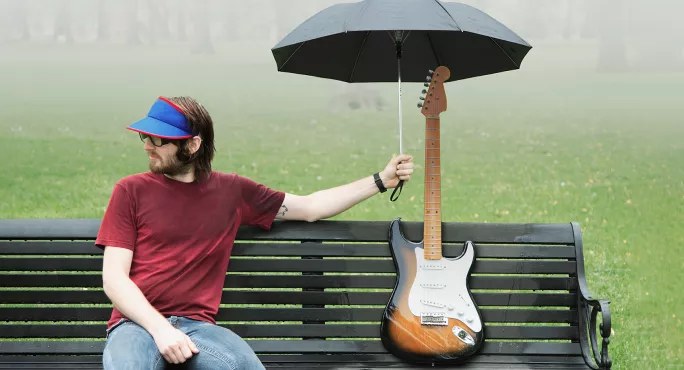Music education in Scotland ‘diverse but fragile’

How do you help more people make music - and take it as far as they can?
John Wallace and Mae Murray, the driving forces behind the Music Education Partnership Group, which exists to ensure music is valued, nurtured and experienced by all, decided a good start would be ensuring that no matter where you live in Scotland, or the stage of the musical journey you are on, the music-making opportunities available in your local area are easy to discover. And so, the idea for the We Make Music (WMM) Companion was born.
Now - following months of painstaking research - the Companion, an online tool that signposts and celebrates the diversity of music education activity in Scotland, has launched.
The Companion - which can be found here - provides a searchable database and interactive map of educational opportunities, community organisations, amateur and semi-professional music groups and online resources. It also includes guidance for learners and educators, demystifying the different ways music can be taught, learned and made.
It is far from a complete artefact, and probably never will be, but it feels like the start of something.
- Background: Free music tuition continues in Scotland, but demand not met
- Related: How Scotland’s Youth Music Initiative levels the playing field
- Feature: Scrapping fees alone won’t keep the music playing in schools
Conducting the research for the Companion over the past year has been equally inspiring and disquieting. The Scottish music education ecology is thriving, vibrant, complex and progressive. But it is also overworked, underfunded and fragile.
We hope the Companion can affect change and tip the balance back towards the inspiring side as we emerge from a period of unprecedented upheaval for music education, including the drop in engagement caused by the pandemic, the growing use of online platforms and technology and the Scottish government’s abolition of instrumental tuition fees in 2021.
Composers’ demographic profile
External factors, such as Brexit and the cost-of-living crisis, also come into play. Meanwhile, people are starting to take a long overdue look at which musical worlds and practices are prioritised at the expense of others - including looking at the demographic profile of composers featured in conservatoire programmes. This has provoked some healthy (and often heated) debate about how we attribute musical, social and cultural value.
These conversations are timely, as music’s place within formal education becomes increasingly marginalised in wider political rhetoric - see the prime minister Rishi Sunak’s blinkered view of what legitimate compulsory education entails, and the attack on perceived “low-value” degrees. We need to work against this marginalisation, pull together as a sector and solidify music’s place in all stages of people’s lives. But at a time when every sector seems to be facing existential crises, this is not without its challenges.
Scotland’s school instrumental music services have recovered well post-Covid. The annual instrumental music survey reported an increase of 14,544 learners (35 per cent) between 2021 and 2022, reaching pre-pandemic levels. However, a cautious eye should be kept on how the removal of fees continues to affect pupil numbers, and if local authorities have the capacity to accommodate all who hope to learn instruments.
These local authority services are frequently bolstered by Youth Music Initiative (YMI) provision and partnerships with grassroots music organisations.
Mapping music provision for the Companion has made it abundantly clear how crucial Creative Scotland’s funding of YMI activity is to schools, as well as the many grassroots organisations that rely on it to offer financially and culturally accessible music provision in communities across Scotland.
Squeezed out of private music tuition
These instrumental services and community organisations are increasingly important to learners who may be squeezed out of private music tuition. Organisations who support learners from areas of higher deprivation, special educational needs and disabilities or additional support needs learners, care-experienced young people or other marginalised groups are particularly vulnerable to any changes to the funding landscape.
In exploring the incredible work conducted in these areas, a theme of fragility and overstretching emerged. No sooner had a case study been written or an entry made to the Companion than it had to be edited because of a change to funding circumstances, staff rationalisation, programme re-design or worse.
This is also true in the higher education and further education sectors, which face similar crises. See the Academy of Music and Sound’s removal of free short course provision and the ongoing industrial action in Scottish universities and colleges.
Making the WMM Companion is akin to painting the Forth Road bridge - as soon as it is finished, it is time to start again. But it is a vital resource that encourages learners, practitioners and educators to contribute to an ever-changing musical ecology. It showcases grassroots organisations, educational institutions and national companies alike. In the face of rapid change and uncertainty, these organisations work tirelessly to make music accessible for all.
The Companion may never be complete but even an incomplete picture shows a sector that is fuelled by passion, curiosity and creativity. We hope that encapsulating the richness of Scottish music education in the Companion will help ensure it is valued, sustained and grown for generations to come.
Graeme Smillie is a musician and educator based in Glasgow and Cat Major is an artist and designer based in Dumfries and Galloway. They are researchers behind the We Make Music Companion
You need a Tes subscription to read this article
Subscribe now to read this article and get other subscriber-only content:
- Unlimited access to all Tes magazine content
- Exclusive subscriber-only stories
- Award-winning email newsletters
Already a subscriber? Log in
You need a subscription to read this article
Subscribe now to read this article and get other subscriber-only content, including:
- Unlimited access to all Tes magazine content
- Exclusive subscriber-only stories
- Award-winning email newsletters



